Admiral Sir Tony Radakin, Chief of the Defence Staff, underscored the central role of Britain’s nuclear deterrent in safeguarding national security during his annual lecture at the Royal United Services Institute (RUSI).
Radakin characterised the current geopolitical environment as the “third nuclear age,” warning of heightened complexities, proliferating threats, and the weakening of international security frameworks.
Radakin pointed to the UK’s nuclear arsenal as a crucial element of defence, particularly in deterring adversaries like Russia. He highlighted ongoing investments in modernising the UK’s nuclear capabilities, including new submarines, warheads, and a comprehensive overhaul of the nuclear enterprise after decades of underinvestment.
“The UK’s nuclear deterrent is the one part of our inventory of which Russia is most aware and has more impact on Putin than anything else,†Radakin said.
These upgrades, while long-term in nature, reflect a renewed commitment by successive governments to maintain Britain’s strategic edge.
“Previously governments believed they were doing the right thing. Now they know they really are,†he added, stressing the importance of sustained funding even as the full benefits may not be realised for another decade.
Radakin outlined the shifting nuclear landscape, marked by threats from multiple state actors. Russia has engaged in large-scale nuclear exercises and issued threats of tactical nuclear use, while China’s growing arsenal poses a “two-peer challenge” to the United States.
Radakin also cited concerns over Iran’s lack of cooperation with the International Atomic Energy Agency (IAEA) and North Korea’s erratic behaviour and expanding ballistic missile programme. These developments, Radakin warned, demand robust deterrent capabilities and a collective commitment to international security.
The Chief of Defence Staff praised nuclear non-proliferation as one of the great successes of international security since World War II, crediting the willingness of nations like the UK and US to extend their nuclear umbrella to allies. However, he cautioned that this framework is now under strain.
“Nuclear non-proliferation has been successful because of states that took their international responsibilities seriously,†he said.
Highlighting the importance of confidence in Britain’s military and strategic capabilities, Radakin urged the UK to lean into its strengths as part of a powerful transatlantic alliance. He highlighted the stark contrast between Europe and America’s collective wealth and Russia’s economic decline as a testament to the strategic advantages of unity.
“The UK must demonstrate resolve, leadership, and self-belief. This keeps us safe even in a more dangerous world,†he concluded.
At the UK Defence Journal, we aim to deliver accurate and timely news on defence matters. We rely on the support of readers like you to maintain our independence and high-quality journalism. Please consider making a one-off donation to help us continue our work. Click here to donate. Thank you for your support!



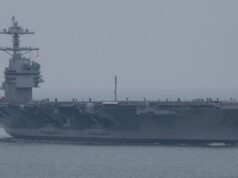
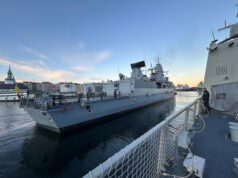
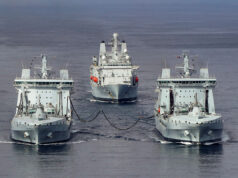




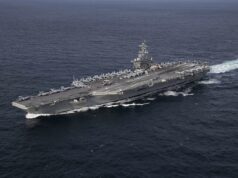
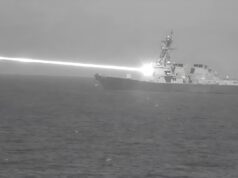


I wonder how long until the Donald starts dropping hints about not letting the UK access trident missile replacements unless we agree to join him in surrendering Ukraine. He has already started on Canada.
We need to start our own missile program regardless of cost ASAP. If nothing else it’s leverage against MAGA as the uk pulling out of trident only hurts America.
If Trump withdraws support from Ukraine, aid from others including UK won’t be enough to prevent a Russian victory. There is no need for him to pressure others to follow his lead.
We don’t have any right to replacement missiles- we lease an agreed number sufficient for our 4 boats. Rotation for maintenance in the US is the only real point of pressure.
I don’t like the reliance on the US either- it tends to make us too ready to support US policy, a la Tony Blair. But developing a Trident replacement from scratch would be very costly- nuclear is already absorbing 40% of the equipment budget. A second system, perhaps cruise missile based, would add to the deterrent effect Radakin describes and might be less expensive. With so many other demands on funding, there is little chance of it happening.
Would it not be sufficient to develop sovereign facilities in the UK to maintain the missiles?
Yes this would be good enough in the short term but I can’t see the USA agreeing to this. Longer term we need to stop being joined at the hip with the USA.
The Donald is the start of a process in US politics not the end. The USA was exactly like this pre 1941, The Donald is a reversion back to the days of pre FDR presidents. The writing is on the wall and having such a close relationship with the USA won’t do us any favours long term.
A British built missiles by MBDA derived from M51 is very doable. It’s not cheap but it’s a drop in the bucket compared to the cost of renewing trident.
Any eventual US replacement for Trident D5 is going to be expensive as well, just look at the cost of Sentinal ICBM which is currently bankrupting the USAF.
It may be cheaper for us to go M51 than cover 25% of the cost of Trident E6.
The US is now providing barley a third of the aid going to Ukraine and Europe is far out producing the USA in munitions now so why do you think Ukraine can’t survive with out US support?
The entire historic US aid package is 0.2% of European GDP on an annual basis and the vast bulk of Forzen assets are held in Europe with almost nothing held in the USA.
South Korea, Canada, Japan and Australia are all on side also so why do you think the USA is such a big deal? It certainly was in the first two years as it had the biggest stockpiles but now we are talking manufacturing it’s not that big a deal and I can’t image the Donald would not agree to sell ammunition at a profit to Europe to send to Ukraine.
Where did you get your figure for nuclear absorbing 40% of the budget? The Budget is £59.8 billion, do you think we spend £24 billion on nuclear weapons?
The actual figure is £3 billion roughly 6% just so you know. The total development cost for the M51 missile in France was €4 billion. That’s about 3% of what we are spending on successor.
u.k won’t pull out of the trident project untill the next option becomes available.
And where is the budget to develop this system coming from…?
I understand the concern about Trump’s erratic behaviour, but he’s also a pretty vocal Anglophile and unlikely to cause any fuss about an allied nation paying into US defence.
If we do nothing because of the mantra “and where’s the money coming from?”, nothing will ever get done. We need to prioritise. If it’s deemed a high priority to have our own ICBM manufacture, the money will need to come from areas we don’t believe are such high priorities. We certainly mustn’t self-censor because of some spurious claim that the country’s broke or jibes about magic money trees.
From the 0.2% increase in defence spending pledge by the government.
Needs to be much more.
I’m still remaining hopeful (or delusional) that the Defence Review comes out with some clear actionable objectives that we can put money into. Even better if they can be used to support British industry at the same time.
But we need to be cracking 3%. The US can no longer be trusted to support NATO fully and, as the next most senior member, we must take up the gauntlet.
I’d rather Radakin talk of conventional deterrence, but he won’t.
Everyone knows we have the bomb and can eradicate European Russia, including Putin.
We are not going to let fly Trident if Russia lands a few dozen IRBM with conventional payloads like they did with Ukraine or combat starts in other areas.
And I have doubts Putin would do that either given the uncertainty of our response and the possibility of mistaken nuclear escalation.
We are effectively hiding behind NATO membership as our big stick where we once had several big sticks ourselves until HMG scrapped them regardless of NATO membership.
I agree that conventional deterrence needs continually pushing. In the recent consultation paper on the Defence Industrial Strategy, six priorities were laid out. Five had to do with economic prosperity and growth and only one talked about deterrence and supply…the last one.
What big sticks outside of nuclear did we ever have in the last to threaten Russia/soviet union with? T also the government recently committed to long range cruise missiles aired with Germany. Very big conventional stick that we never had before.
I would say our long range conventional deterrents are in a better shape than ever with TLAM and Storm shadow and F35B from carriers.
The paucity of the 2.5% was highlighted in the RUSI speech (available on .gov.uk) as follows:
“history … shows us that the cost of defence and deterrence is always less than the costs that flow from instability and conflict.
“The largest direct financial impact for the UK [of the Ukraine conflict] is not the additional £3 billion Defence gets for Ukraine, welcome though that is. It is the £75 billion energy subsidy to shield consumers from the cost of rising energy bills as a direct result of Russian aggression. Aggregated across Europe the energy subsidy grows to nearly £700 billion.”
I believe this is the sort of argument that needs hammering home to a wider audience.
That’s an argument for windmills and hydrogen in the UK rather than defence spending. No amount of European defence spending would have prevented Russia’s invasion of Ukraine. NATO already outspends the Russians 20 to 1 and it did not stop a thing. You think a 40 to 1 spending ratio would have changed things?
We will have to disagree on your assertion that no amount of spending in the West would have deterred the 2022 invasion of the Ukraine. It followed 20 years of Putin testing us, slowly ramping up his attacks on the West and judging our response, trying nuclear and chemical attacks on UK citizens to deliberately step over red lines, and for the better part of those 20 years we did nothing practical, and even reduced our Defence spending after he invaded Georgia. We’ve been so good at sending the wrong signals that only a stonking increase in the Defence budget will give our politicians any credibility.
A simple and relatively inexpensive way to respond to Putin’s threats would be to drop our self-imposed limits on deployed missile and warhead numbers.
Link the decision directly to Russian nuclear threats to the UK, so there can be no doubt who is responsible.
I agree, I would move right back up to the maximum number of weapons. I believe given our warheads are similar to W76 we can get 12 on each missile meaning 192 per boat and we need a stockpile of nearly 600. No need for decoys as S400 is a joke. Just lots of MIRV’s all armed.
Trident is a Uber cold war system with massive over kill that we have never truly exploited, time to do it now as this is the only kind of message we can send to Vlad.
If the French up their numbers too then European NATO can have over 1000 deployed nuclear weapons which is a similar amount of China and only 500 behind USA and Russia.
That is more than sufficient to detter any aggression even without the USA.
Is it time re reassess our lack of tactical/air launched nuclear weapons? I understand the French have just updated their delivery system (ASMPA-R) which, if they are willing to cooperate, might offer a solution (with UK package of course)?
I don’t think so, I think we either have nuclear strategic response or massive prompt conventional strike via cruise missiles. The only way I see us getting into tactical weapons is if the US pulls out of NATO and we have to take over the dual key B61 role for Germany and others.
French tactical missiles are more about facing a land invasions that is not an issue for us.
I suspect the ‘success’ of non-proliferation post WWII owed a lot to the fact that relatively few countries in the decades following the war had the industrial capacity to consider building nuclear warheads. Nowadays there are at least several dozen that could do it if they wanted to.